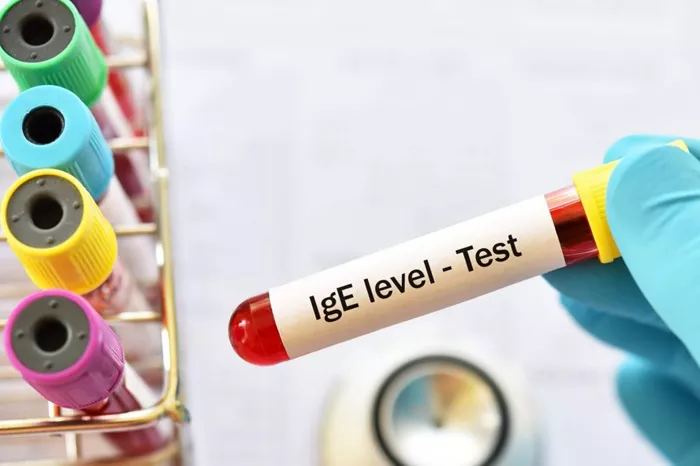An IgE test, short for immunoglobulin E test, is a diagnostic tool used to detect the presence of IgE antibodies in the blood. These antibodies play a crucial role in the body’s immune response, particularly in allergic reactions. When the body encounters an allergen, such as pollen or pet dander, it triggers the production of IgE antibodies, which bind to specific cells and release chemicals that cause allergy symptoms.
In this article, we will explore what a positive IgE test result means for allergy diagnosis and management, as well as its implications beyond allergic conditions.
Understanding IgE Antibodies: The Body’s Allergic Response
Before delving into the interpretation of a positive IgE test, it’s important to understand the role of IgE antibodies in the immune system’s response to allergens.
The Allergic Cascade
When an individual with allergies is exposed to an allergen, such as pollen or dust mites, their immune system produces IgE antibodies specific to that allergen. These IgE antibodies bind to mast cells and basophils, two types of immune cells found in various tissues throughout the body.
Release of Chemical Mediators
Upon subsequent exposure to the same allergen, the bound IgE antibodies trigger the mast cells and basophils to release inflammatory chemicals, such as histamine and leukotrienes. These chemicals cause the typical symptoms of an allergic reaction, including sneezing, itching, swelling, and in severe cases, anaphylaxis.
The Role of IgE Testing
IgE testing measures the levels of IgE antibodies in the blood, providing valuable information about a person’s allergic sensitivities. A positive IgE test indicates the presence of elevated IgE antibodies specific to particular allergens, suggesting an allergic response to those substances.
Interpreting Positive IgE Test Result: Allergy Diagnosis and Management
When interpreting a positive IgE test result, several factors need to be considered, including the individual’s medical history, symptoms, and exposure to potential allergens.
Confirmation of Allergic Sensitivities
A positive IgE test confirms the presence of allergic sensitivities to specific allergens. For example, if someone tests positive for elevated IgE antibodies to pollen, it suggests that they are allergic to pollen and may experience symptoms such as hay fever (allergic rhinitis) during pollen seasons.
Identification of Allergen Triggers
IgE testing helps identify the specific allergens triggering an individual’s allergic reactions. By determining which allergens elicit an IgE response, healthcare providers can recommend targeted avoidance measures and allergy management strategies.
Guidance for Allergy Treatment
Positive IgE test results guide allergy treatment decisions, including the selection of allergen-specific immunotherapy (allergy shots) and prescription medications. Immunotherapy involves exposing the individual to gradually increasing doses of the allergen to desensitize their immune system and reduce allergic symptoms over time.
Monitoring Allergy Severity and Progression
Regular IgE testing allows healthcare providers to monitor changes in allergic sensitivities over time and assess the effectiveness of allergy treatment. Decreasing IgE levels may indicate successful allergy management, while persistent elevation may suggest ongoing exposure or the need for adjustments to treatment strategies.
Beyond Allergies: Non-Allergic Conditions Associated with Elevated IgE
While IgE testing is primarily used in the diagnosis and management of allergic conditions, elevated IgE levels can also be associated with non-allergic diseases and disorders.
Atopic Dermatitis (Eczema)
Individuals with atopic dermatitis, a chronic inflammatory skin condition characterized by dry, itchy skin, often have elevated IgE levels. IgE-mediated mechanisms contribute to the inflammation and immune dysregulation observed in atopic dermatitis, making IgE testing useful for diagnosis and disease monitoring.
Parasitic Infections
Parasitic infections, such as helminth (worm) infestations, can stimulate the production of IgE antibodies as part of the body’s immune response to the parasites. Elevated IgE levels may indicate the presence of parasitic infections and aid in their diagnosis.
Hyper IgE Syndrome (Job’s Syndrome)
Hyper IgE syndrome, also known as Job’s syndrome, is a rare primary immunodeficiency disorder characterized by recurrent infections, eczema, and elevated IgE levels. Genetic mutations affecting the immune system’s regulation of IgE production lead to the characteristic features of the syndrome.
Autoimmune Diseases
Some autoimmune diseases, such as systemic lupus erythematosus (SLE) and rheumatoid arthritis (RA), may be associated with elevated IgE levels. While the exact mechanisms underlying this association are not fully understood, IgE-mediated immune responses may contribute to the pathogenesis of these conditions.
Conclusion: Navigating the Complexities of IgE Testing
In summary, a positive IgE test result indicates the presence of elevated IgE antibodies specific to allergens or other immune triggers. While IgE testing is instrumental in diagnosing and managing allergic conditions, it can also provide valuable insights into non-allergic diseases and disorders associated with elevated IgE levels.
Interpreting IgE test results requires careful consideration of the individual’s medical history, symptoms, and exposure to potential allergens or immune triggers. By understanding the significance of IgE testing and its implications for allergy diagnosis, management, and beyond, healthcare providers can effectively guide patient care and improve outcomes for individuals with allergic and immunological conditions.
[inline_related_posts title=”You Might Be Interested In” title_align=”left” style=”list” number=”6″ align=”none” ids=”8786,8717,8713″ by=”categories” orderby=”rand” order=”DESC” hide_thumb=”no” thumb_right=”no” views=”no” date=”yes” grid_columns=”2″ post_type=”” tax=””]
































